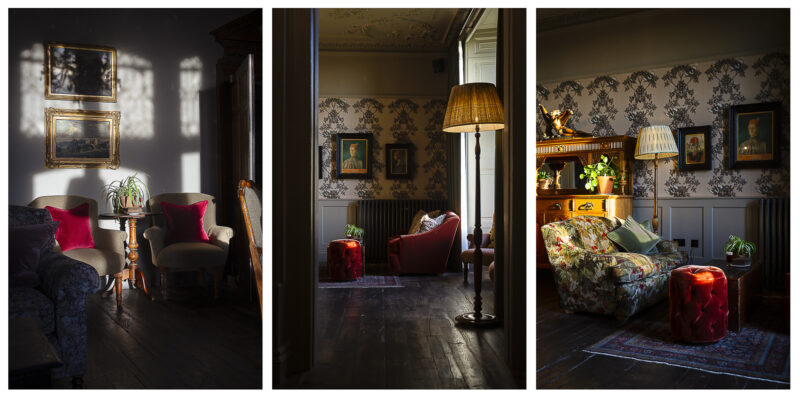Come and discover the beauty of South Devon.
Devon is a beautiful county, with stunning coastlines, idyllic villages, breathtaking landscapes, busy towns and a thriving food scene. It's one of England's top destinations, where you'll find a rugged coastline rolling into the gorgeous English countryside. We focused during our trip on Dartmoor and the Jurassic Coast, which was plenty to keep us busy.
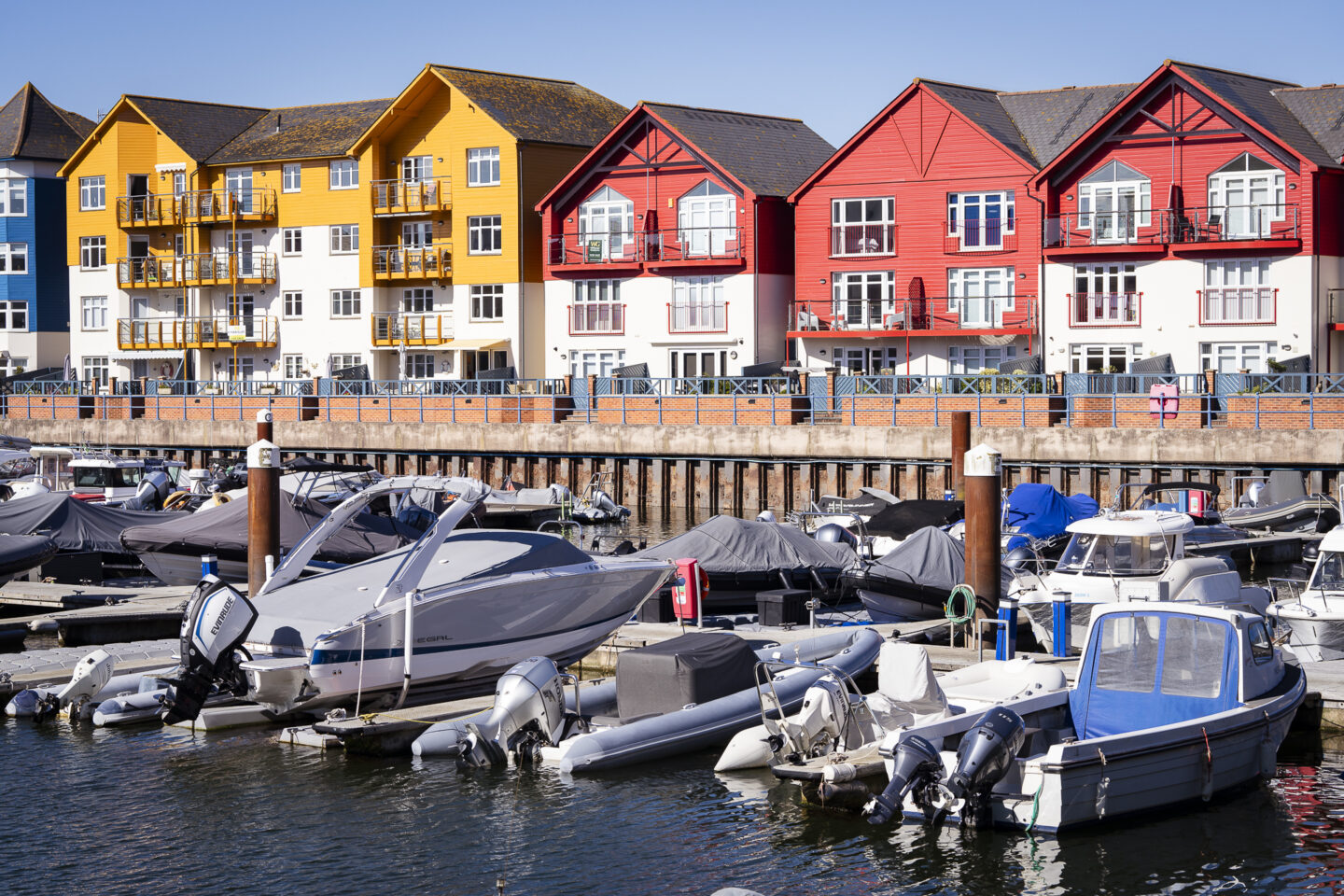
Dartmoor National Park, a unique nature reserve
Dartmoor National Park is a one-of-a-kind destination. With its rugged terrain, quaint villages, and rich history, it's a place that will captivate your imagination. You can spend days exploring the sleepy towns or meandering through the vast moors, where ponies and sheep roam free. Dartmoor is a hiking paradise, with trails winding through the park and rock formations waiting to be scaled. During our visit, we had the chance to tour a sheep farm, an old inn perched on the moor, and charming Chagford.
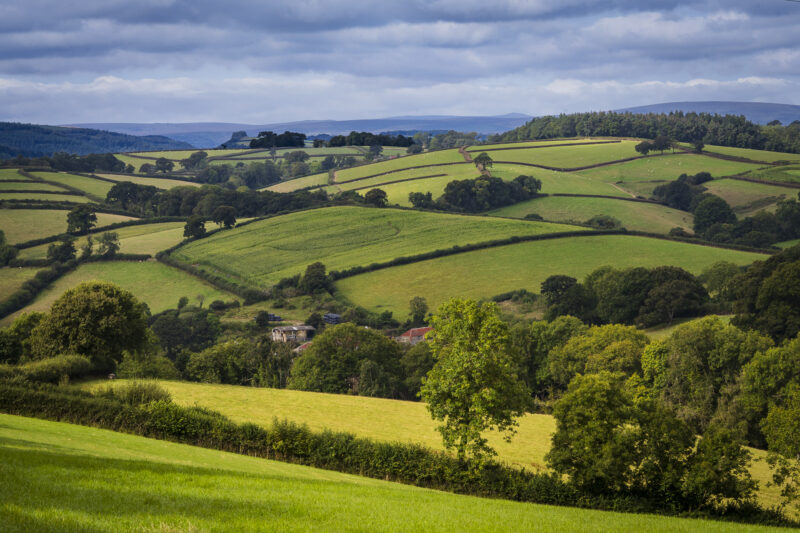
The Dartmoor Shepherd, a holistic sheep farm
Lewis and Fiona are the proud owners of The Dartmoor Shepherd, a one-of-a-kind sheep farm with a holistic and organic approach to farming. They don't use pesticides, fertilizers, or chemicals and follow the idea of using the animals themselves to mimick and help nature. Their animals are only fed vegetation from the pastures. Lewis and Flora are also working on improving the soil quality. Ultimately, better soil means better nutrition for the sheep.
Dartmoor Shepherd is one of the last farms raising the three traditional Dartmoor breeds of long-haired sheep together in a commercial flock. The animals provide meat that's marbled with fat, which makes it super tender and tasty. Lewis and Flora raise sheep with beautiful, strong coats, and the demand for the products made from these coats is really high. The Dartmoor Shepherd sells its meat and sheepskins through its own web shop.
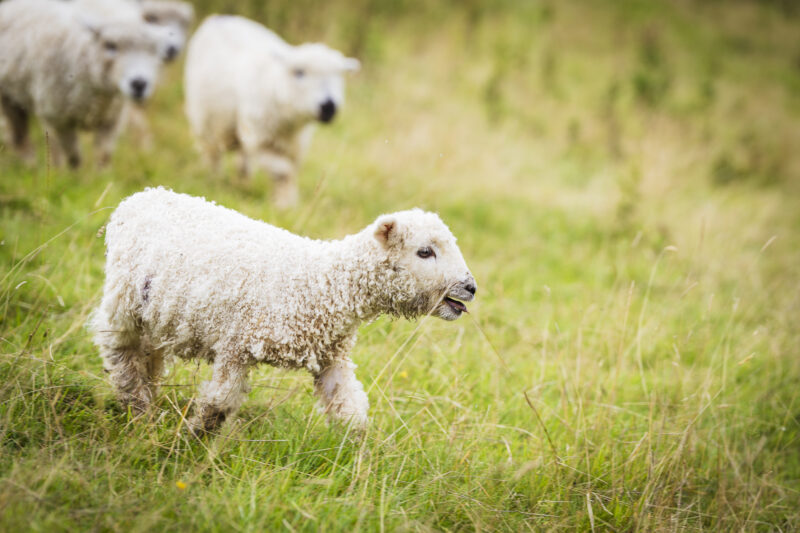
Warren House Inn, a historic landmark
Warren House Inn, the historic, highest-located inn in southern England, is perched more than 400 meters above sea level in a remote spot in Dartmoor. It's not just the beautiful natural surroundings and distant views that make this cozy inn so popular—there's also a legendary hearth fire that's been burning for nearly 200 years! The story goes that smoldering peat from a neighboring inn in decline was carried across the road to the newly built Warren House Inn. The fire has been burning ever since. Even at night, it continues to crackle and glow.
The inn has quite a fascinating history. It offers a vivid picture of life on and around Dartmoor, from the 18th century to the present. The inn’s location on the east-west route through Dartmoor has seen many passing through, including miners, traders, and travelers. Some were interesting characters, while others were illustrious or obscure. And with all these people came all sorts of stories, from love and loneliness to camaraderie, pleasure, and sorrow.
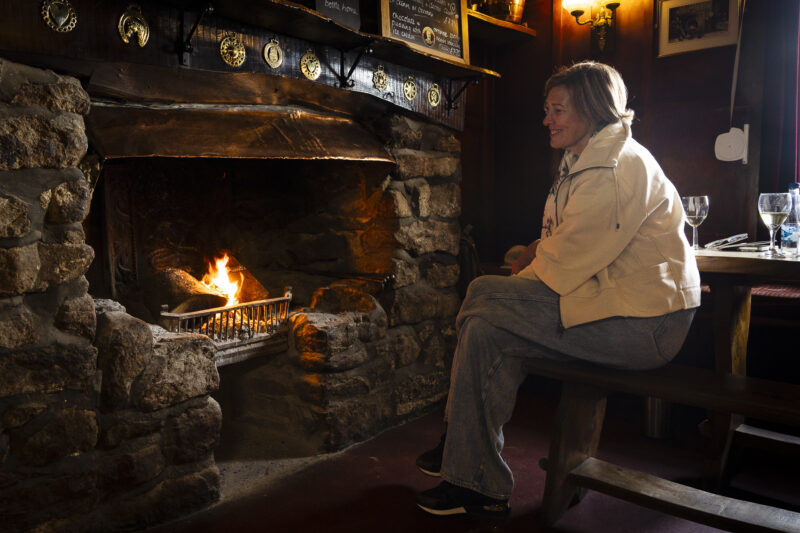
The Warren House Inn has had many landlords throughout its nearly 200-year history. Its current owner is Peter Parsons, who's been running the place since 1988. He made some major updates, including installing a new generator (the inn is in the middle of nowhere, so there's no electricity) and a climate-controlled cellar to make sure the beer doesn't freeze in the pipes during the harsh winters on the moors.
The Warren Inn is your classic traditional pub. You'll find "real ale," as Peter Parsons puts it, and local food. Their rabbit pie is legendary. You should visit, just for the cozy atmosphere, but also because of the amazing surroundings, especially in August when the landscape turns purple with heather flowers blooming.
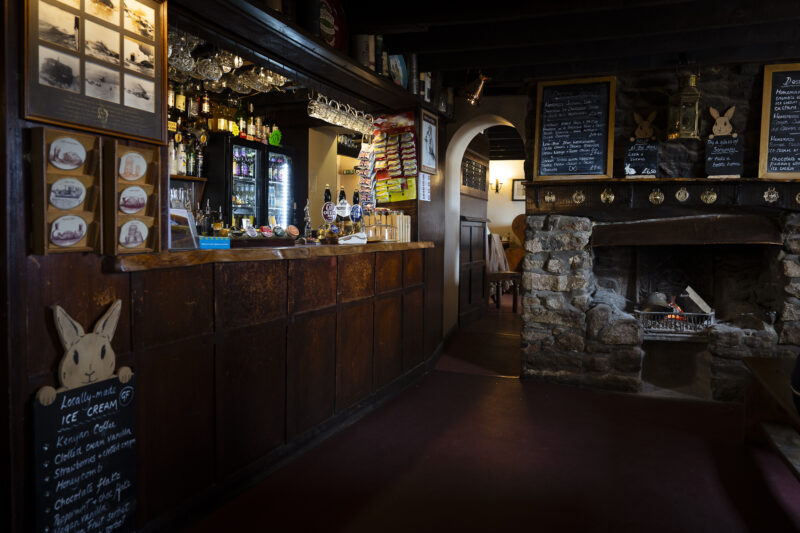
Picturesque Chagford
The lovely town of Chagford is nestled in the gorgeous countryside of Dartmoor. Winding, cobblestone streets link cozy stores with historic buildings and lively squares. Even with the summer crowds, there's an atmosphere of charm and hospitality.
Chagford is also a great spot for foodies. There are lots of pubs, restaurants, and cafes serving traditional dishes and delicacies made with local ingredients. We went for lunch at the Chagford Inn, a no-frills gastropub serving amazing food at a great price.
I enjoyed the perfectly cooked duck breast with kale, apricot puree and grilled sweet onion. Didier went for the succulent chicken supreme with red cabbage, Yorkshire pudding and roasted carrot. It was a delicious, beautifully presented meal with excellent value for money.
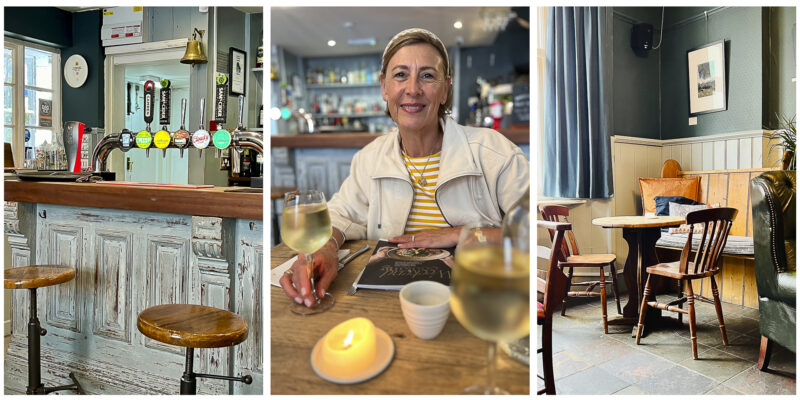
The Jurassic Coast, a geological marvel
The Jurassic Coast is a geological wonder stretching from Exmouth in Devon to Swanage in Dorset. It offers a glimpse into our planet's ancient past and has been classified by UNESCO as a World Heritage Site. The dramatic cliffs, hidden coves, and pebble beaches, bear witness to the Triassic, Jurassic, and Cretaceous eras, spanning a staggering 185 million years. In the midst of this magnificent spectacle, there are numerous activities and places of interest to enjoy.
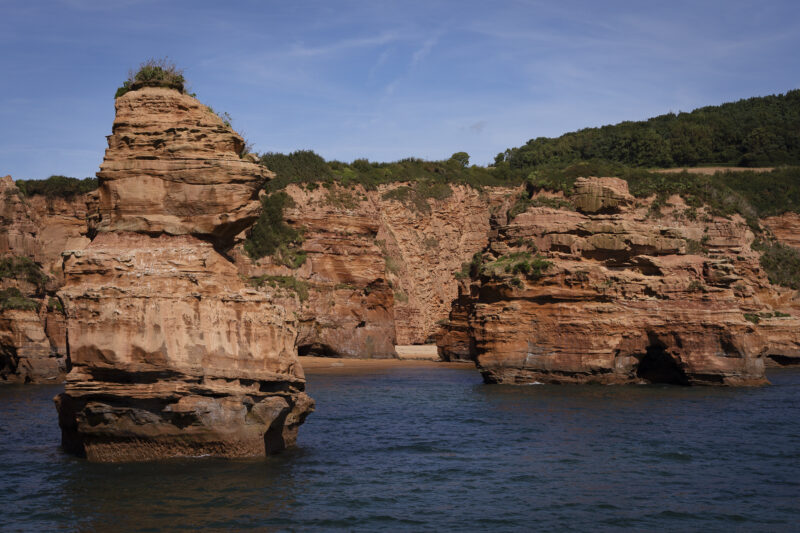
5 must-do activities along the Jurassic Coast.
1. Go on a Jurassic Coast Cruise
One of the best ways to see the Jurassic Coast is from the water. Stuart Line Cruises is the only company that runs round-trip cruises along the stunning coastline. The three-hour cruise from Exmouth Marina to Sidmouth and back offers views of the oldest part of the coast, which dates back to the Triassic, and is characterized by impressive red rocks. When the weather is good, you get unobstructed views from the upper deck. There are drinks and snacks on board, and the captain talks you through the most important and beautiful rock formations. Sometimes you might even spot dolphins.
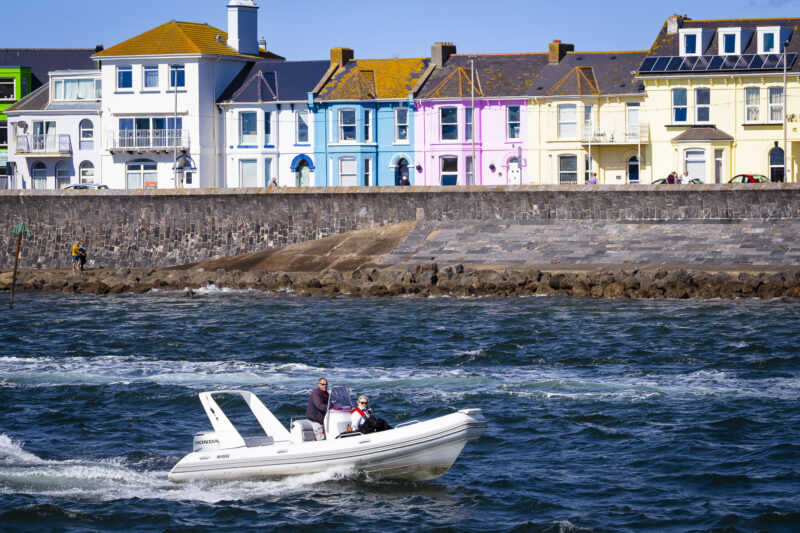
2. Go fossil hunting
One of the most enjoyable activities along the Jurassic Coast is fossil hunting. I suggest you start your search between Lyme Regis and Charmouth after a storm. Just keep your eyes wide open on the pebbles and you’re guaranteed to find something. The most common fossils are from seashells, sea urchins and ammonites. Remember that you can only collect loose fossils found among the sand and boulders. In some places it is even forbidden to collect fossils. Don't remove any fossils from the rocks and avoid the cliffs because they're unstable and prone to crumbling. Also keep an eye on the tides so you don’t get cut off. We explored the fossil beach at Lyme Regis and came across the imprint of a huge ammonite fossil on a rock.
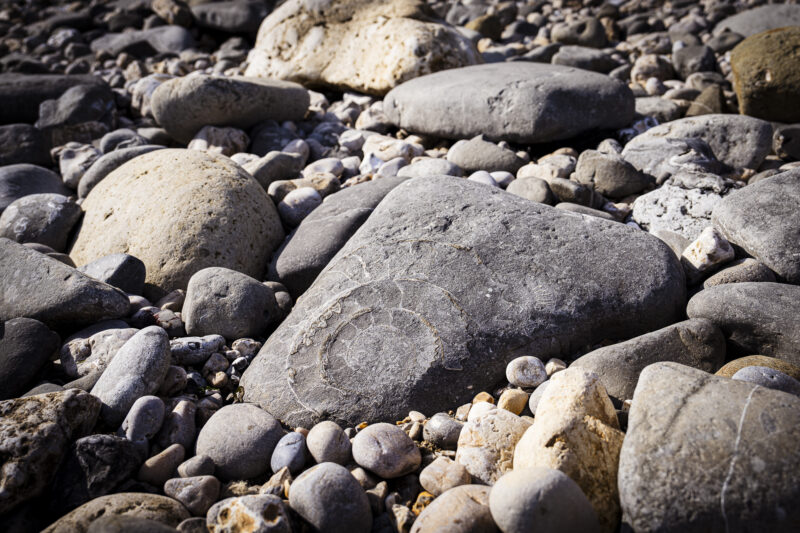
3. Hike the cliff tops
If you'd like to take in the Jurassic Coast in all its splendor, another great option is to view it from the clifftops. You can do that by hiking part of the 630-mile South West Coast Path. The route runs along the whole coastline of southwestern England and is really spectacular between Lyme Regis and Plymouth. We hiked from the village of Beer to the stunning Hooken Cliffs. This is a distinctive section of the South West Coast Path, featuring white chalk cliffs that are geologically younger than the red sandstone cliffs that characterize most of the Devon coastline.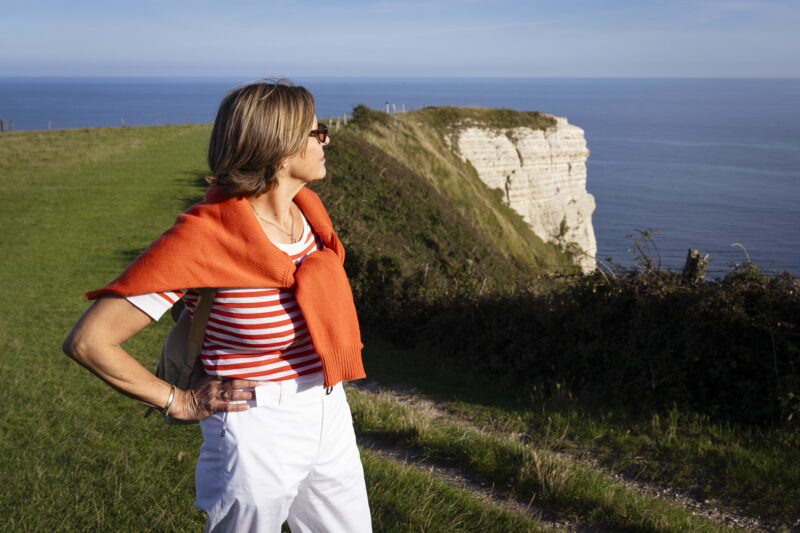
4. Visit a quaint coastal town
Devon is a gorgeous place with a breathtaking coastline, full of quaint fishing villages and picture-perfect seaside resorts. The only problem is choosing which ones to visit!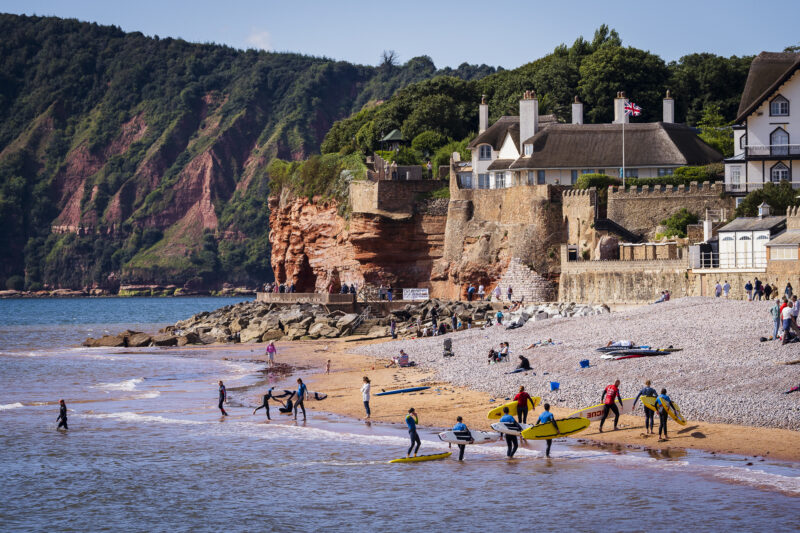
Beer
Beer is a classic Devonshire fishing village where fishing is still king. The large pebbly beach is lined with colorful fishing boats selling their daily catch of mackerel to the locals. There are also some lovely walks departing from Beer to deserted beaches and cliff tops.
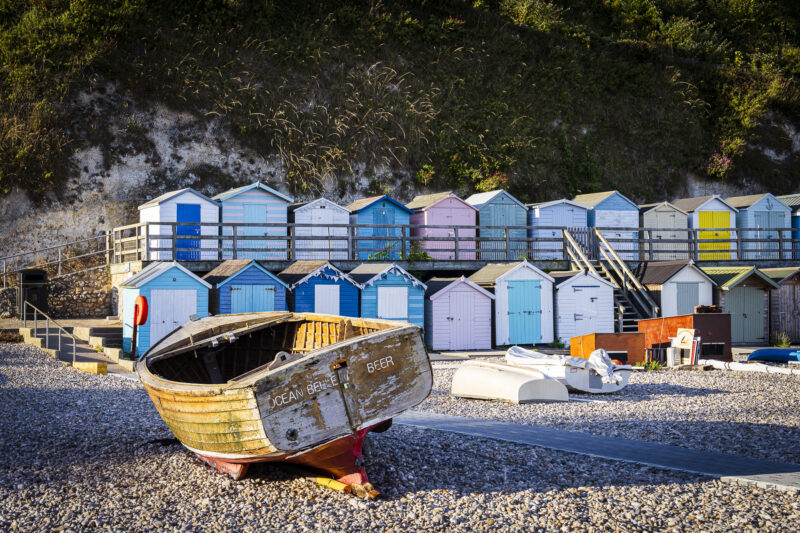
Sidmouth
Set against a backdrop of dramatic Triassic red rocks, the vibrant and sophisticated town of Sidmouth is a favorite with young and old alike. The seaside resort was a popular destination in the 1800s, even attracting the attention of Queen Victoria, who vacationed here as a young girl. The town boasts a wealth of historic buildings, situated both in the center and along the beachfront. There's a great selection of stores and cosy restaurants to be found everywhere. The Millennium Walkway runs along the entire length of the beach, lined with colorful beach huts.
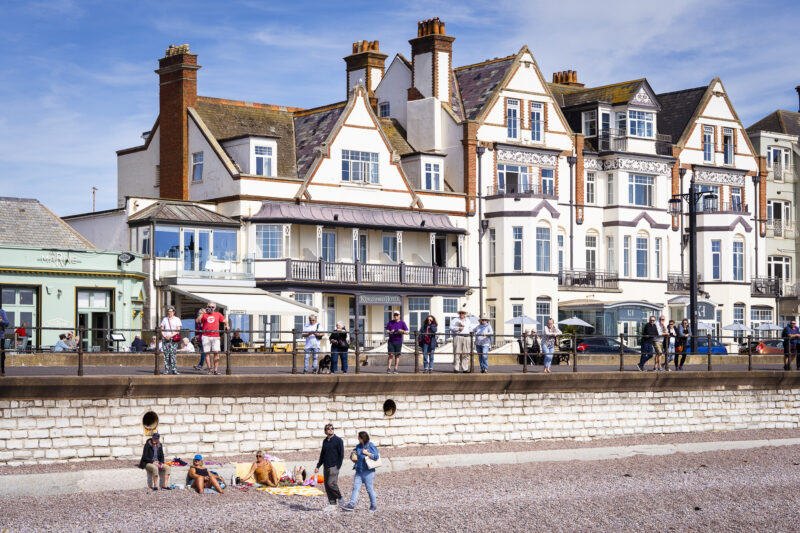
Lyme regis
Lyme Regis is another lovely, lively fishing town along the Jurassic Coast. It is actually no longer in Devon, but on the border with neighboring Dorset. It's been called the jewel of Dorset for good reason! In the bustling center, there's a fantastic selection of shops selling souvenirs, clothing, fossils, and beach gear. The area boasts pretty, colorful cottages and fishing and leisure boats in the marina. There are several beaches, including a fossil beach.

5. Enjoy the freshest fish and seafood
The Jurassic Coast is more than just a feast for the eyes. From the sea comes a daily supply of the freshest fish and seafood you can imagine. So why not taste the sea on your plate at one of the many seafood restaurants as you look out over the crashing waves?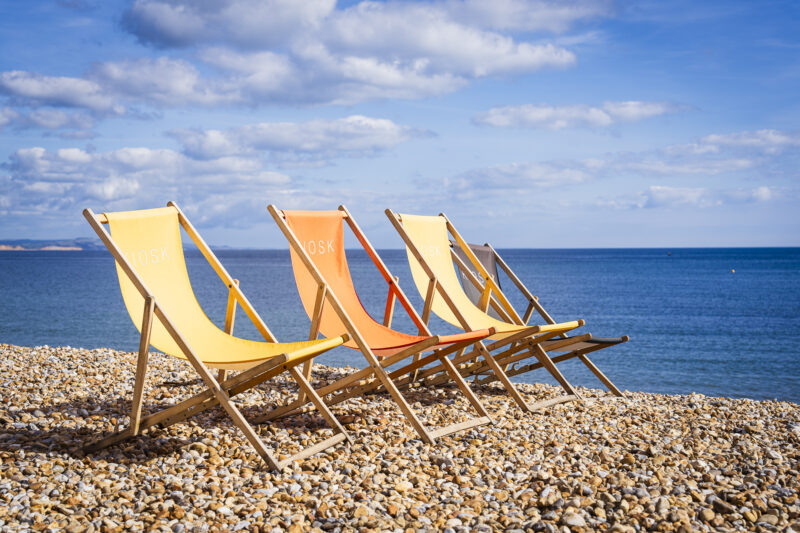
Rockfish – Exmouth
If you're looking for delicious, super-fresh fish with a breathtaking view of the sea and the Exe estuary, Rockfish is the place to go. The friendly staff will tell you what's caught that day, and the chef will then bake, fry, or grill it over charcoal for you. It doesn't get any fresher than that! If the weather allows, you can eat on the terrace. We started with some delicious, pickled anchovy fillets, followed by salt and pepper Brixham calamari and freshly caught, dressed crab in the shell.
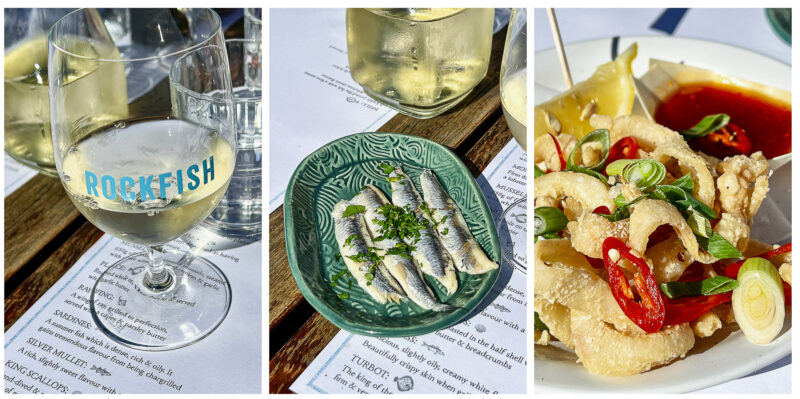
The Oyster & Fish House – Lyme Regis
The Oyster & Fish House in Lyme Regis has some of the best fish and seafood dishes on the Jurassic Coast. The restaurant has great views of the marina and the sea through floor-to-ceiling windows. We sampled some local oysters, then enjoyed char-grilled mackerel and plaice.
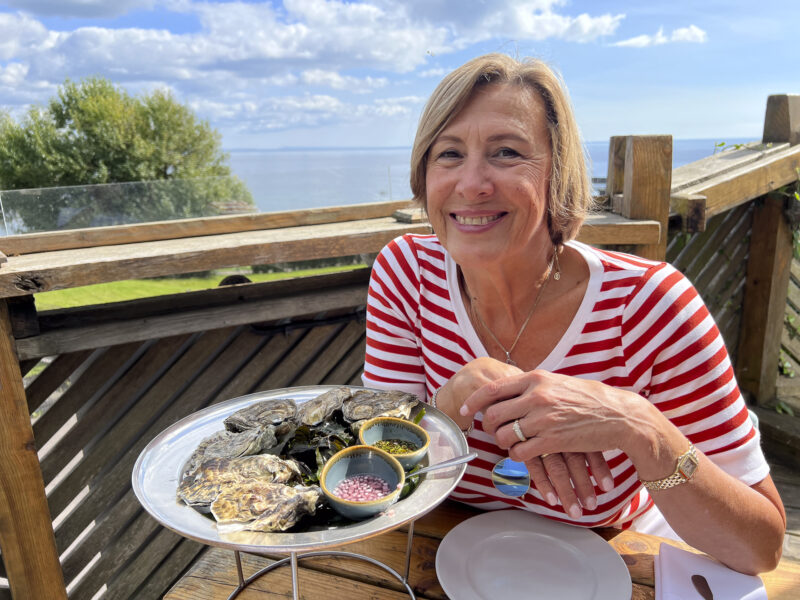
Winemaking in England: Kenton Park Estate
England isn't usually the first place that springs to mind when you think about wine. But you might be surprised to learn that it actually has a long history of winemaking, going back to Roman times.
The history of English wine
It was the Romans who planted the first vineyards in England, but it was the Norman nobles who really brought the knowledge of viticulture across the Channel a thousand years later. Monasteries further elaborated on the techniques during the Middle Ages, but a change in climate caused English viticulture to decline by the late Middle Ages.
During the 17th and 18th centuries, there was a newfound interest in growing grapes. Some wealthy landowners tried planting vineyards, which eventually led to commercial viticulture that began in the 1950s. Now there are more than 750 vineyards and 200 wineries in England producing mostly traditional sparkling wine. English wines are mainly made from the grape varieties Pinot Noir, Chardonnay, Gewürztraminer, and Bacchus, which is a cross between Riesling, Sylvaner, and Müller-Thurgau.
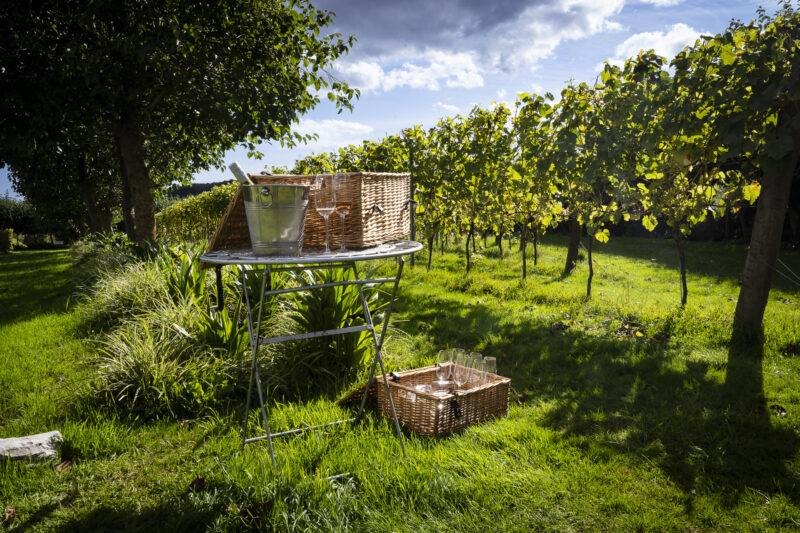
Kenton Park Estate
We visited Kenton Park Estate, a wine estate established in 2003 that's nestled among the rolling hills, at the Exe River estuary in South Devon. The area’s south-facing slopes, sandy soil, and sunny micro-climate are great for viticulture. Kenton Park Estate makes sparkling and fresh white wines, some of which have won awards for their excellent quality. They also have their own gin and whiskey and the apples from the orchard are turned into delicious ciders.
Kenton Park Estate wants its customers to have a great time, and that includes having a place to have a drink and a bite to eat. The Motley Cru Bar is the place for cocktails and wine tastings. At The Vineyard Kitchen, you can get coffee and cake, brunch, lunch, and afternoon tea.
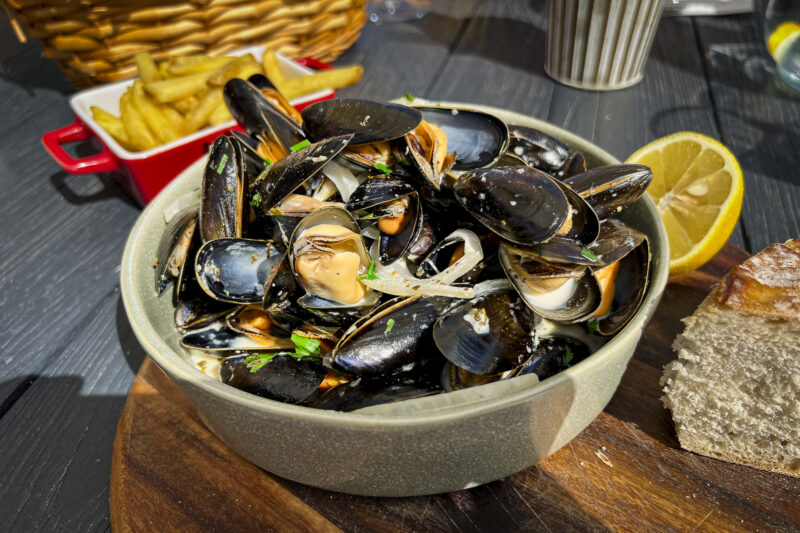
Kenton Park Estate takes wine tasting a step further, taking you into the vineyards themselves. In groups of 2 to 12 people you enjoy a walk among the vines while the guide talks you through the winery and the wines. You'll have the chance to taste a selection of wines at various "tasting stations" along the way.
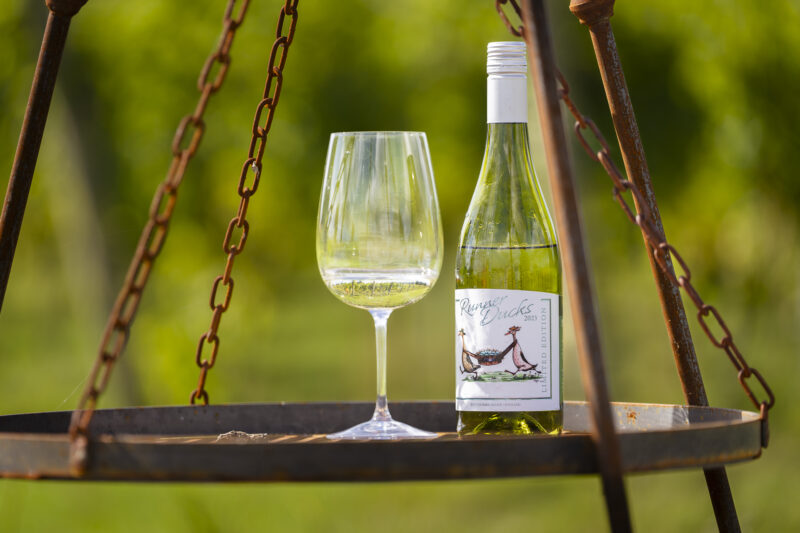
Mud & Wine Experience
Kenton Park Estate offers tours and tastings at the winery, but their Wine in the Wild program takes the wine experience to a whole new level. This package includes a wine tasting plus activities like paddleboarding, fishing, clay pigeon shooting, or off-roading. We signed up for the Wine and Mud Experience, for which we first headed over to the Westcounty Land Rover Experience location nearby. We spent three hours on the off-road course with an expert instructor, learning the ropes on the Land Rover Defender, old and new style.
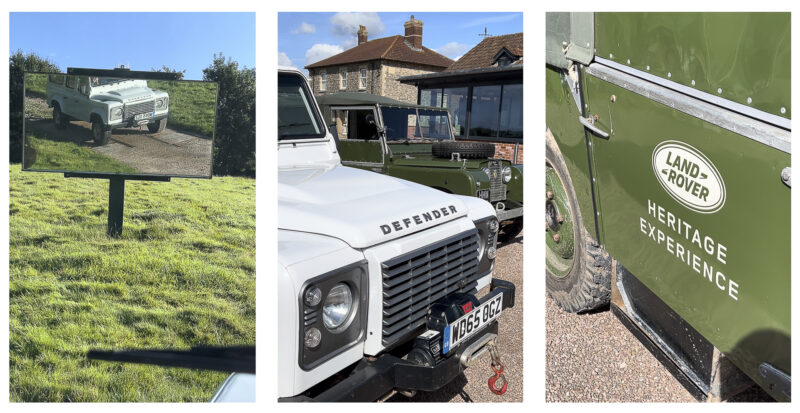
After a great time, we drove to the wine estate for a tasty lunch on the sunny terrace, followed by a tasting among the vineyards. We tried the elegant Motley Cru Sparkling Rosé, made with 78% Pinot Noir and 20% Chardonnay grapes, and the crisp, dry Runner Ducks, a white wine made from 100% Bacchus grapes. The full-bodied Pheasant Tales wine is also made with 100% Bacchus grapes, but it's also barrel aged. The Magical Mists, made with the Solaris grape, has deeper fruity notes and a beautiful label created in-house. Finally, we tried the Pigéage Rosé, a dry and elegant blend of Solaris and Pinotin with notes of red berries.
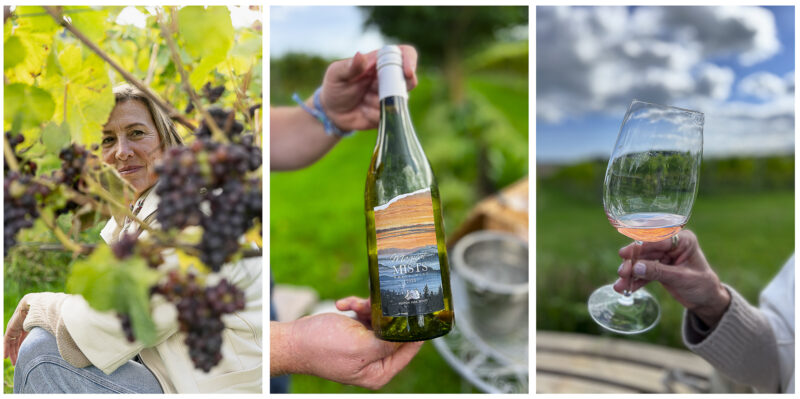
Sleeping in Devon
Lympstone Manor
Lympstone Manor is a beautiful country house hotel right on the Exe estuary. The hotel is surrounded by vineyards and rolling hillsides, giving it a really elegant, luxurious feel. While the surroundings are absolutely breathtaking, you come to Lympstone Manor for the incredible cuisine of celebrity chef Michael Caines. From the moment you arrive, culinary indulgence is the common thread throughout your stay at Lympstone Manor, making it a truly unforgettable experience!
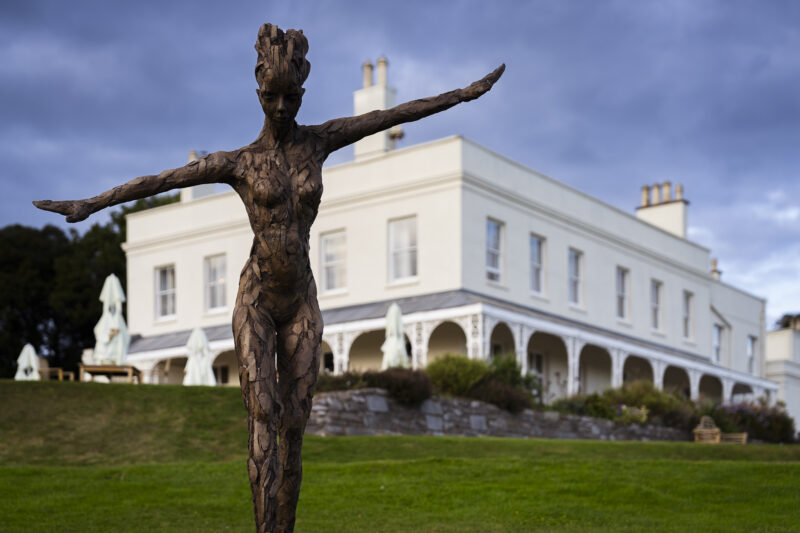
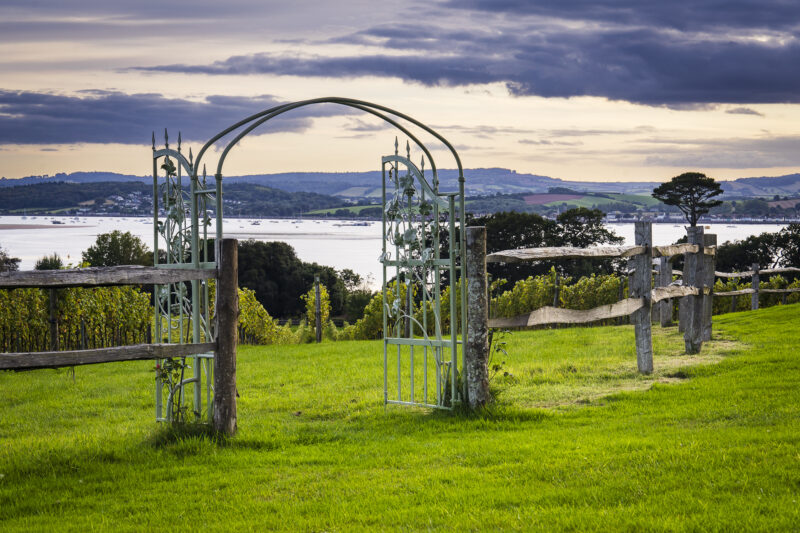
The Pig @ Combe
The Pig @ Combe is a charming boutique hotel in the gorgeous English countryside of Southeast Devon. The estate has a fascinating history dating all the way back to the 11th century. It was then owned by Bishop Odo, who was a half-brother of William the Conqueror. The current manor house was built in 1572 and has been welcoming guests as a hotel since the 1960s. The house, outbuildings, and walled kitchen garden were completely restored about 10 years ago. The hotel is surrounded by a gorgeous garden with centuries-old trees, which is perfect for a leisurely stroll!
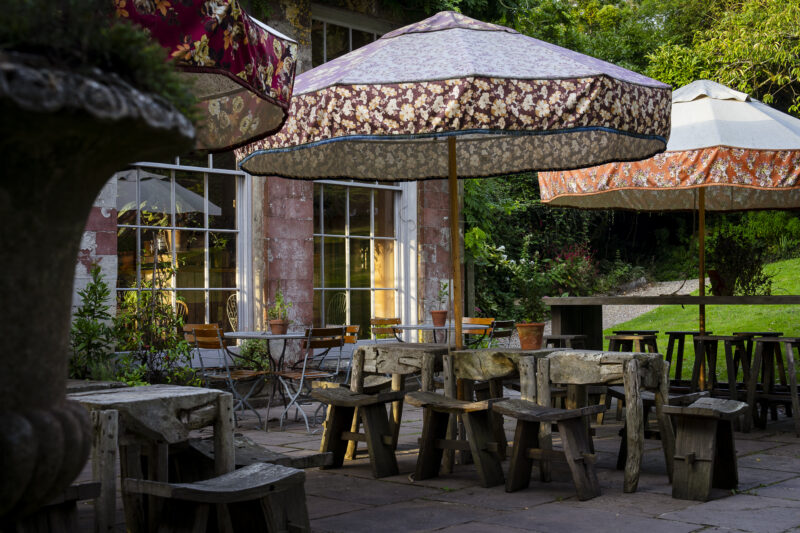
The pet-friendly hotel is always full of activity, and the decor is cozy and befitting of a centuries-old mansion. As with all Pig hotels, the restaurant is the heart and soul of the hotel. The menu varies according to what is harvested from the kitchen garden that day. The fish is caught right off the coast, just a few miles from the hotel, while the cheeses and meats are sourced locally. Oh, and there's also a spa with holistic treatments.
